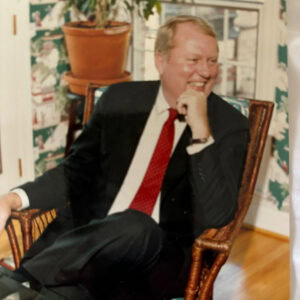
William D. Barnard
On December 13, 2024, William Dean Barnard died in Fort Lauderdale, Florida.
Bill was born in Birmingham, Alabama, on September 18, 1942. His early education was in the local public schools, and he went on to earn a BA in history at Birmingham–Southern College, followed by an MA and a PhD both earned at the University of Virginia. His dissertation, written under the supervision of Edward E. Younger, was revised and published as Dixiecrats and Democrats: Alabama Politics, 1942–1950 (Univ. of Alabama Press, 1974). One reviewer described the book as “elegantly concise” and “the labor of conspicuous scholarship.” Bill taught in the Department of History at the University of Alabama, Tuscaloosa, from 1979 to 1993. He served as chair of the department and earned the rank of professor emeritus. He also served as assistant to the chancellor of the University of Alabama System. While working at Alabama, Bill began his long-standing relationship with the University of Oxford—first as the administrator of a study-abroad program that brought students from Alabama to Balliol and Wadham Colleges. Later, after he moved to Oxford, he became chief invigilator at the university.
But there was more to Bill than his academic career. Since his graduate school days, Bill was a political junkie, and his finger never left the pulse of the American governmental scene. He was always a shrewd analyst of national and state-level maneuverings. After Bill moved to England in 1998, he became involved with Democrats Abroad UK. He was elected to a four-year term as chair of that group in 2007, during which he oversaw the organization of absentee voting by citizens working or living in the United Kingdom. In addition, he represented the Democratic Party’s position to the English media, including frequent appearances on the BBC and Sky News. When his chairmanship ended, he continued to appear regularly on British television as an analyst of the American political scene.
Bill was a true son of the South. He was a gentleman with courtly manners and elegant speech, but he could also explain in astonishing detail the differences among regional variations on Southern barbecue. He had wide-ranging tastes in both music and books. He liked classical to country, and there was no literary genre that he hadn’t at least sampled.
His many achievements notwithstanding, Bill was a humble man. He had a spirit that was generous and warm and an intellect that was unassuming and modest. His book is dedicated to his parents, who, “by their example, instilled in their children a respect for the dignity of all human kind.” That was a lesson that inspired his support of the Civil Rights Movement in his youth and a commitment to social justice throughout his whole life.
Bill Barnard was a friend of mine for a number of years. We saw each other more regularly after he came to the same part of Florida to escape English winters that I had come to escape Pennsylvania winters. In a Venn diagram of our respective historical interests, there would be little intersection, except for a shared appreciation of beautifully written history. We spent many happy hours introducing each other to our favorite historians and their work—and thanks to him, I learned some Southern history.
Bill is survived by his husband, Rob, with whom he shared the last 33 years. Also surviving are three children from his first marriage, seven grandchildren, and one sister. He also leaves behind many, many friends, and he will be greatly missed by all who knew him.
Brian R. Dunn
Clarion University of Pennsylvania (emeritus)
This work is licensed under a Creative Commons Attribution-NonCommercial-NoDerivatives 4.0 International License. Attribution must provide author name, article title, Perspectives on History, date of publication, and a link to this page. This license applies only to the article, not to text or images used here by permission.